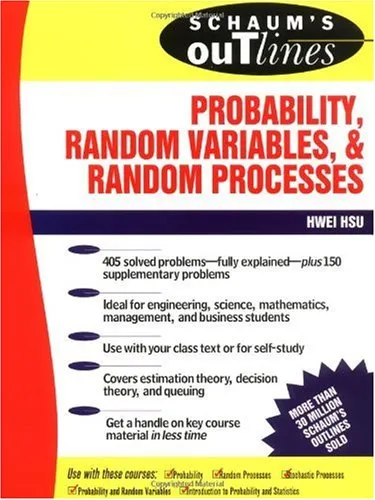Schaum's outline of theory and problems of probability, random variables, and random processes
4.6
Reviews from our users

You Can Ask your questions from this book's AI after Login
Each download or ask from book AI costs 2 points. To earn more free points, please visit the Points Guide Page and complete some valuable actions.Schaum's Outline of Theory and Problems of Probability, Random Variables, and Random Processes
Welcome to an essential and comprehensive guide created specifically for students, professionals, and enthusiasts eager to deepen their understanding of probability, random variables, and random processes. "Schaum's Outline of Theory and Problems of Probability, Random Variables, and Random Processes" provides a structured approach to mastering a subject that is fundamental to mathematics, engineering, and data sciences. This structured outline brilliantly integrates theoretical concepts with practical problem-solving tools to yield a rich learning experience.
Detailed Summary of the Book
This informative outline is an invaluable resource for anyone tackling the complexities of probability and random processes. The book is meticulously organized into progressive chapters, ensuring readers build foundational knowledge before advancing to more intricate topics. It begins with a lucid exploration of basic probability theory, including the axioms of probability, conditional probability, independence, and Bayes' theorem. These form the cornerstone of the book's methodology.
The text transitions into comprehensive coverage of random variables, focusing on their classifications (discrete and continuous), probability distributions, density functions, and moment analysis. Challenging concepts such as joint distributions, expectations, and laws of large numbers are explored through clear explanations, accompanied by worked-out examples.
The final portion of the book introduces readers to random processes and their applications. It discusses concepts like stationarity, ergodicity, power spectral density, Markov processes, and queuing theory — pivotal topics in operations research, signal processing, and modern technologies. Each concept is demystified using step-by-step problem-solving techniques, allowing readers to grasp both the theoretical framework and its practical implications.
With over 430 solved problems and additional practice exercises, the book reinforces learning, helping readers internalize the content while building technical problem-solving expertise.
Key Takeaways
- A solid grasp of fundamental probability principles, random variables, and associated distributions.
- Step-by-step problem-solving skills to analyze and interpret diverse probabilistic systems.
- Understanding of random processes and their real-world applications in science, engineering, and communication systems.
- Access to worked-out examples and practice exercises for self-assessment and thorough preparation.
- Theoretical insights paired with applied problem-solving techniques for a balanced learning experience.
Famous Quotes from the Book
"The essence of probability lies in understanding uncertainty and drawing insights from patterns that emerge in randomness."
"In problem-solving, precision comes not from memorizing formulas but from truly understanding their derivation and applications."
"Random processes are not just mathematical abstractions but frameworks that reveal the beauty of structured chaos in real-world systems."
Why This Book Matters
Probability and random processes play a crucial role across multiple disciplines, from statistics and data science to artificial intelligence, telecommunications, and financial engineering. Yet, the subject's inherent complexity can be daunting for many learners. This book uniquely bridges that gap, providing a roadmap to mastery through a well-designed pedagogical approach and practical problem sets.
What sets this book apart is its problem-solving emphasis. The inclusion of numerous solved examples ensures that students not only understand theoretical concepts but also gain confidence in applying them to real-world scenarios. The clear, logical explanations significantly aid in breaking down complex ideas into manageable learning units.
Moreover, the outline’s accessibility makes it relevant to undergraduate and graduate students alike, as well as professionals seeking to revisit fundamental concepts in their field of work. Its clarity and comprehensiveness stand as a testament to Schaum's tradition of making technical subjects approachable for learners worldwide.
For anyone striving to master probability, random variables, or random processes, this book serves as a quintessential guide to navigate these fascinating but challenging areas. The combination of theoretical rigor, practical applications, and problem-solving mastery makes it indispensable for academic success and professional growth alike.
Free Direct Download
Get Free Access to Download this and other Thousands of Books (Join Now)
For read this book you need PDF Reader Software like Foxit Reader


